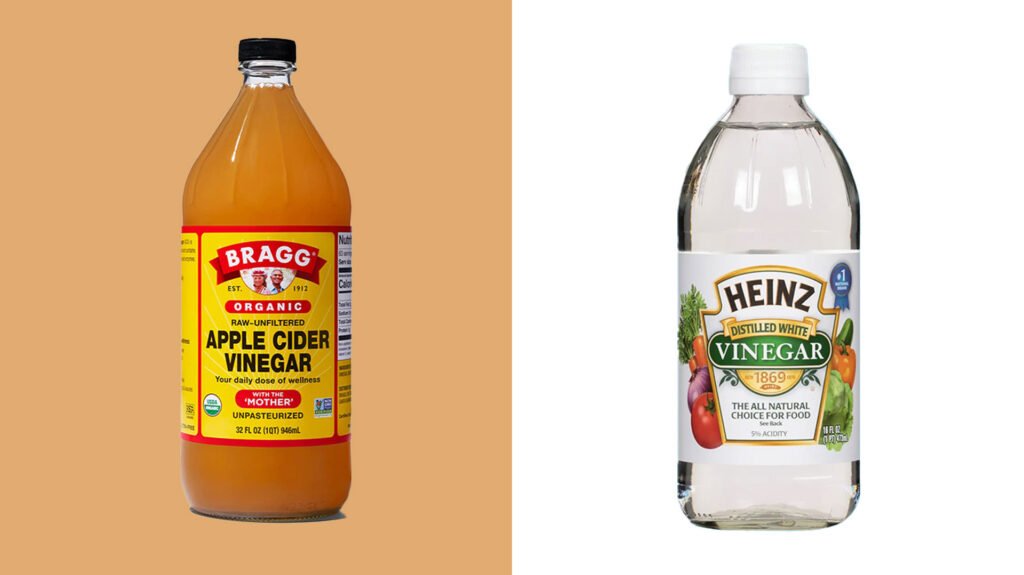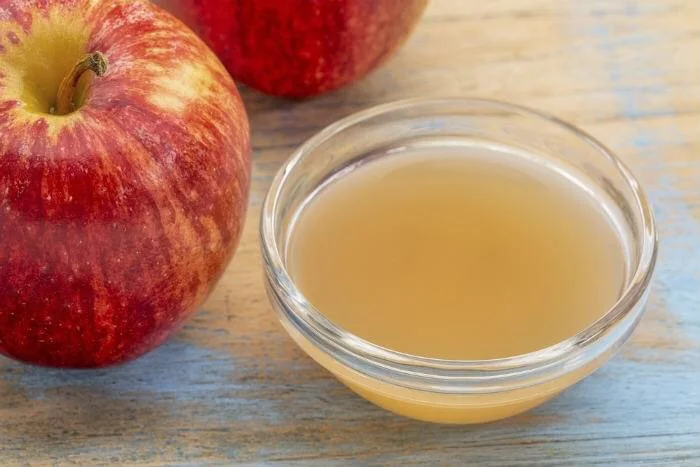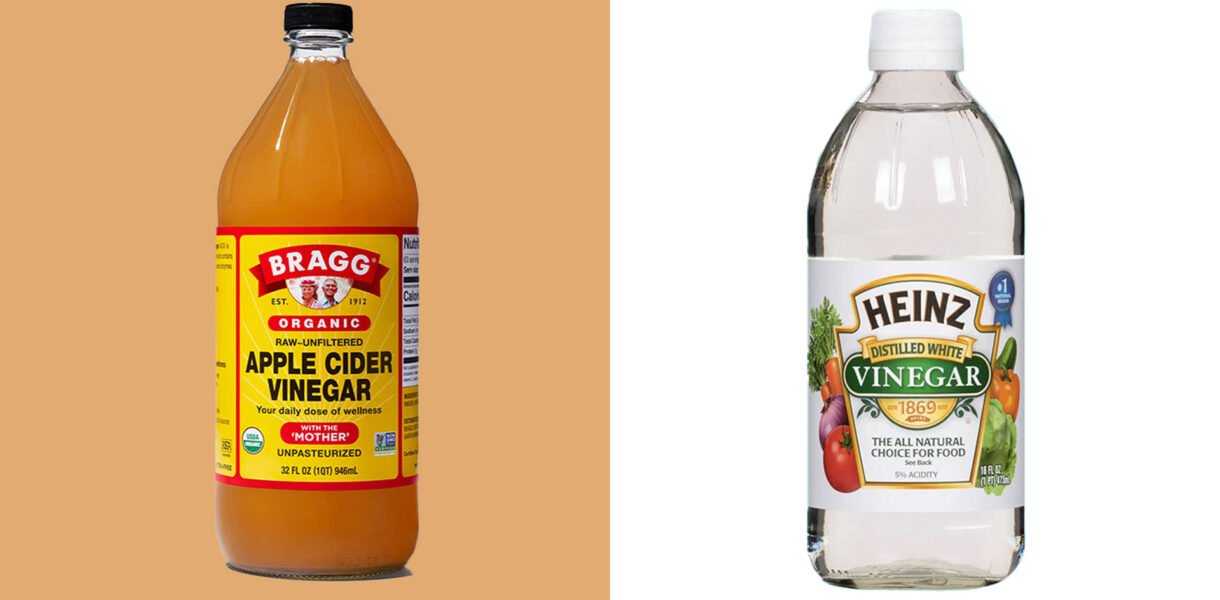Apple cider vinegar and white vinegar are kitchen staples, but did you know they boast a range of health benefits too? From aiding digestion to potentially boosting insulin sensitivity, these vinegars are more than meets the eye. But which one comes out on top: apple cider vinegar or its white counterpart? Let’s dive into the great vinegar debate!
Apple Cider Vinegar vs. White Vinegar

Today we’re going to talk about apple cider vinegar versus distilled white vinegar. What are the differences? What are the similarities? Does it matter which one you take?
Well, over here we have apple cider vinegar, which is about five to six percent acetic acid. And then the white vinegar is about four to seven percent acetic acid – very, very similar.
- Apple cider vinegar contains 5-6% acetic acid.
- White vinegar contains 4-7% acetic acid.
The big difference is the source. Apple cider vinegar obviously comes from apples, and white vinegar could come from grains (barley, corn, sugar), potato, milk (whey – believe it or not, it’s a protein in milk), and other grains. And of course, this corn could be, you know, GMO unless this is organic.
- Apple cider vinegar is sourced from apples.
- White vinegar can be sourced from various grains, potatoes, or whey.
- The source of white vinegar may be GMO unless specified as organic.
Now with apple cider vinegar, in one tablespoon you have about eleven milligrams of potassium, okay? It’s not a lot of other vitamins or minerals in this product, and just realize that our bodies require about 4700 milligrams, so 11 milligrams is pretty insignificant.
- One tablespoon of apple cider vinegar contains 11mg of potassium.
- Apple cider vinegar does not contain significant amounts of other vitamins or minerals.
Now certain types of apple cider vinegar, like Bragg’s raw (which is organic), has a sediment at the bottom of it. It’s called the mother, which is a tiny bit of bacteria, other things like fiber, and maybe some enzymes.
- “The mother” in raw, unfiltered apple cider vinegar is a sediment containing bacteria, fiber, and enzymes.
And of course over here we have distilled white vinegar.
Which is better?

Of course, if you have organic apples and you’re gonna make apple cider vinegar, two of these ingredients – obviously this is going to be a much better source plus it has some additional things to help you. However, if we take a look at the acetic acid, these are very, very similar.
So the effects of white distilled vinegar versus apple cider vinegar are going to be pretty close, if not identical.
- The quality of ingredients determines which vinegar is “better”.
- Organic, raw, unfiltered apple cider vinegar is preferable due to the quality of source ingredients.
- Both types of vinegar have very similar effects due to their comparable acetic acid content.

But because the source is low quality, I would recommend obviously doing the organic, raw, unfiltered vinegar because who knows if there’s additional chemicals involved, especially if it’s made from corn? I don’t even know if they’re giving you the source on the back of the label of of what this is made out of. Yes, the mother has a tiny bit of bacteria – friendly bacteria – but it’s so insignificant, the chances of that helping you are are just very, very minor compared to these two right here.
- Organic, raw, unfiltered vinegar is recommended due to potential chemical additives in lower quality vinegars.
- The “mother” in apple cider vinegar contains beneficial bacteria, but the quantity is likely insignificant.
Benefits of Vinegar

So number one, it gives you a digestive aid. Most people are lacking the acidity in their stomach. What happens when they eat food, especially protein, is they have an incomplete digestion.
So they get indigestion, bloating, gas. They have a difficult time breaking down protein, and that can end up with a lot of issues like constipation and just incomplete digestion. You put a tablespoon of vinegar in water, drink it before a meal, and you’ll feel much better.
- Vinegar aids digestion by increasing stomach acidity.
- Increased stomach acidity can help alleviate indigestion, bloating, gas, and constipation.
- Consuming one tablespoon of vinegar in water before meals can improve digestion.
Plus if you aid the acidity in your digestive system, you’ll assimilate minerals much better. One symptom that a lot of people have is cramping, or even twitching – could be the left eyelid, or on the arm, or they get muscle cramps in their calf or their foot.
Well, if you take vinegar in water, that can make those cramps go away because it alters your pH, so you can start absorbing and transporting minerals much better, especially calcium.
- Improved acidity also increases mineral absorption.
- Vinegar can alleviate muscle cramps and twitches by improving mineral (especially calcium) absorption and transport.

Yes, you can use electrolytes for cramping, but the vinegar (and I always use apple cider vinegar) can really help you with those cramps tremendously.
- Apple cider vinegar is particularly effective for relieving cramps.
Also the vinegar can actually stimulate your liver to make more bile to help with the fat digestion, especially the absorption of vitamin A, D, E, K1, K2, Omega-3 fatty acids, and some of the other fats as well.
- Vinegar stimulates bile production in the liver, further aiding digestion.
- Increased bile production improves fat digestion and absorption of fat-soluble vitamins (A, D, E, K1, K2) and omega-3 fatty acids.
The other big benefit of vinegar in general is the improvement of insulin sensitivity. Since the great majority of the population has insulin resistance and I don’t even know it, taking vinegar can make the insulin more sensitive

so you have less resistance, and that’s going to end up giving you a whole series of benefits which you’ll see all over the place, especially online when you look at the benefits of – outside of vinegar – it will say it helps you with weight loss, blood pressure, skin, acne.
Well, that’s because it improves insulin sensitivity, and anything that will improve this will give you a whole series of additional benefits.
- Vinegar improves insulin sensitivity, which is beneficial for a large portion of the population who are insulin resistant.
- Improved insulin sensitivity can lead to weight loss, lower blood pressure, clearer skin, and reduced acne.
There’s the differentiation and the similarities. If you haven’t seen my topic on apple cider vinegar that had over 17 million views, I put it up right here, check it out!
Summary
Apple cider vinegar:
• 5-6% acetic acid
• Source: raw apples
• 1 tbsp has 11mg of potassium
• Certain types have the “mother” which has a tiny bit of bacteria, fiber, and enzymes
White vinegar
• 4-7% acetic acid
• Source: barley, corn, sugar, potato, milk whey, grains
• Great cleanser
Which is better? It relates to the source. Organic apples are much better than the sources of white vinegar. Apple cider vinegar also has additional benefits that white vinegar doesn’t have. But, the effects of distilled white vinegar and apple cider vinegar are going to be very similar. However, because the sources of white vinegar are low-quality, I would say that apple cider vinegar is a better choice.
Major benefits of apple cider vinegar:
- It’s a digestive aid
- It can improve insulin sensitivity
DATA
https://www.ncbi.nlm.nih.gov/pmc/articles/PMC1785201
FAQ
Can I use apple cider vinegar instead of white vinegar?
Yes, you can generally substitute apple cider vinegar for white vinegar in most recipes, but keep in mind the flavor profile will be different[1][3]. Apple cider vinegar has a milder, fruity taste compared to the sharper, more pungent flavor of white vinegar[5]. White vinegar is better for pickling and cleaning, while apple cider vinegar works well in salad dressings, marinades, and sauces where you want to add a subtle fruity note[4].
Which is healthier, white vinegar or apple cider vinegar?
Apple cider vinegar may have some health benefits that white vinegar lacks. While both provide acetic acid, apple cider vinegar retains more of the nutrients from apples, including antioxidants and amino acids[6]. Some research suggests apple cider vinegar may aid weight loss, reduce cholesterol, and improve diabetes symptoms, but more studies are needed[6]. White vinegar is still a healthy option, but apple cider vinegar may provide additional nutritional value.
Can you use white vinegar instead of apple cider vinegar for hair?
It’s generally not recommended to use white vinegar instead of apple cider vinegar for hair care. Apple cider vinegar is milder and can help balance hair and scalp pH, add shine, and remove product buildup[3]. White vinegar is much more acidic and can be harsh on hair[4]. If using white vinegar, be sure to dilute it well and do a patch test first. Apple cider vinegar is the better choice for a gentle hair rinse.
What’s the difference between apple cider vinegar and rice vinegar?
The main differences are the source ingredients and flavor profiles. Apple cider vinegar is made from fermented apple juice, while rice vinegar comes from fermented rice wine[5]. Rice vinegar has a much milder, slightly sweet taste compared to the tart, fruity flavor of apple cider vinegar[5]. Rice vinegar is commonly used in Asian cuisines, while apple cider vinegar has a wider range of culinary and health applications.
Apple cider vinegar vs white vinegar for skin
Both apple cider vinegar and white vinegar have antimicrobial properties that may benefit the skin[3][6]. However, apple cider vinegar is gentler and may be preferable for skin care. The acetic acid in white vinegar can be irritating, especially for sensitive skin types[4]. Apple cider vinegar may help treat acne, balance skin pH, and reduce inflammation[3]. Always dilute vinegar before applying to skin and do a patch test first.
Which is stronger, white vinegar or apple cider vinegar?
White vinegar is generally stronger than apple cider vinegar in terms of acidity. Standard white vinegar contains 4-7% acetic acid, while apple cider vinegar has 5-6% acetic acid[4][5]. The higher acetic acid content makes white vinegar more potent and better suited for cleaning, pickling, and disinfecting[1][5]. Apple cider vinegar has a milder flavor that works better for cooking, baking, and health tonics[3][5].
Apple cider vinegar vs white vinegar health benefits
Both vinegars provide acetic acid, which may offer some health benefits, but apple cider vinegar may have additional advantages. Some research suggests apple cider vinegar may aid weight loss, improve diabetes symptoms, and reduce cholesterol levels[6]. The antioxidants and amino acids in apple cider vinegar may also provide extra nutritional value[6]. White vinegar lacks these extra nutrients but is still a healthy option. More research is needed on the specific health benefits of each type of vinegar.
Apple cider vinegar vs white vinegar for hair
Apple cider vinegar is generally preferred for hair care over white vinegar. The acetic acid in apple cider vinegar can help balance hair and scalp pH, add shine, and remove product buildup[3]. White vinegar is more acidic and can be harsh on hair[4]. Apple cider vinegar is gentler and provides a subtle fruity scent. Always dilute vinegar before using as a hair rinse and do a patch test first.
Apple cider vinegar vs white vinegar for cleaning
Both apple cider vinegar and white vinegar are effective cleaners, but white vinegar is the better choice in most cases. White vinegar has a higher acetic acid content, making it a stronger disinfectant and stain remover[4][5]. It’s commonly used to clean windows, countertops, floors, and remove odors[3]. Apple cider vinegar can also be used for cleaning, but its milder acidity makes it less effective than white vinegar[1]. White vinegar is the go-to for tough cleaning jobs.
Apple cider vinegar vs white vinegar for cooking
The choice between apple cider vinegar and white vinegar for cooking depends on the desired flavor profile. White vinegar has a sharper, more pungent taste that works well for pickling and adding a sour kick to recipes without altering other flavors[4][5]. Apple cider vinegar has a milder, fruity flavor that enhances salad dressings, marinades, sauces, and baked goods[1][3]. If you want a subtle apple flavor, use apple cider vinegar. If you prefer a more neutral acidity, white vinegar is the better option.
Can I substitute apple cider vinegar for white vinegar
Yes, you can generally substitute apple cider vinegar for white vinegar in most recipes, but keep in mind the flavor will be different[1][3]. Apple cider vinegar has a milder, fruity taste compared to the sharper, more pungent flavor of white vinegar[5]. White vinegar is better for pickling and cleaning, while apple cider vinegar works well in salad dressings, marinades, and sauces where you want to add a subtle apple note[4]. The acidity levels are similar enough that you can use them interchangeably in most cases.
White vinegar vs apple cider vinegar for weight loss
While both vinegars contain acetic acid, which may provide some weight loss benefits, apple cider vinegar may be the better choice. Some research suggests the acetic acid in apple cider vinegar may help suppress appetite, increase feelings of fullness, and reduce the glycemic response to high-carb meals[6]. However, more studies are needed to confirm these effects. Incorporating either type of vinegar into a balanced diet and exercise routine may support weight loss efforts, but apple cider vinegar may provide an extra edge.




